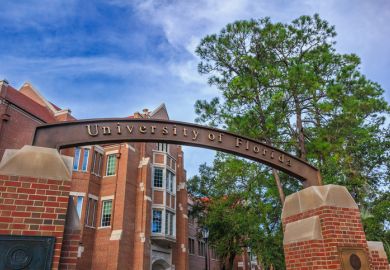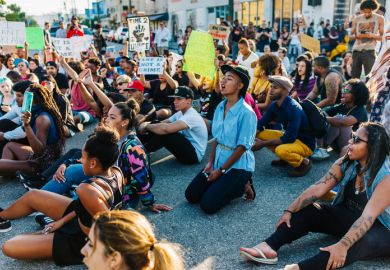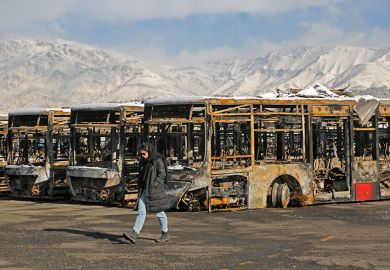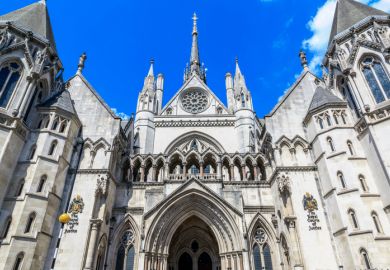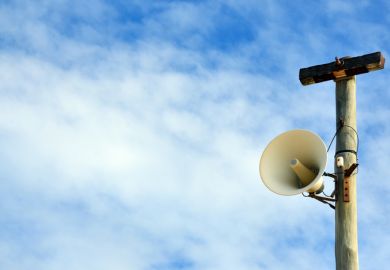More than 400 US academics have faced public protests over ideological speech in the past five years, with nearly three-quarters of the cases ending in some type of job-related sanction, an analysis has found.
The study by the Foundation for Individual Rights in Education (Fire) found that the cases most frequently involved scholars who were white, male and tenured; who made comments on the topic of race; and who attracted pushback from people within their own campus.
Fire describes itself as a non-partisan defender of free speech rights on college campuses, and it portrayed its findings as evidence – in a moment of national concern over right-wing intolerance and violence – that the political left poses the bigger ideological threat.
Of the 426 cases it compiled since 2015, Fire assessed that 62 per cent of them came from the political left of the scholars and just 34 per cent from the right. The organisation described the criticisms of such faculty as “smear campaigns” and called the 74 per cent share of such cases that ended in some type of institutional sanction “alarming”.
Yet a co-author of the report, Komi German, a research fellow at Fire, acknowledged shortcomings. The study was just the first in what the organisation hopes to make an annual series, and Fire hopes in the future to “better convey the political complexity of each incident in ways that allow us to systematically identify patterns”, Dr German said.
In particular, Dr German conceded that she and her authors did “prioritise the perspective of the scholar” facing accusations. The top case it highlighted among the 426 was that of Mike Adams, a professor of criminology at the University of North Carolina at Wilmington who was forced out of his job last year after a history of racist, misogynistic and xenophobic attacks on community members.
Professor Adams died by suicide shortly after his resignation. The numerous complaints against him included a time when he posted to social media a critique of a Wilmington student who backed abortion rights that warned: “The mortality rate among people who disagree with me is right at 100 per cent. So just nod and go with the flow. Or face the consequences.”
Fire described the petitions that led to his resignation as a matter of Professor Adams being “targeted in two separate incidents by students and members of the public to his political left”. Dr German said that Professor Adams “engaged in sarcastic, aggressive ridicule of his ideological opponents, to be sure, but that is distinct from attempting to censor”.
While most academics on Fire’s list are white and male, the four that faced the largest number of signatures demanding action against them were all women.
The largest campaign – with more than 170,000 people demanding her firing – was aimed at Betsy Schoeller, a senior lecturer in information studies at the University of Wisconsin at Milwaukee. Dr Schoeller, a colonel in the Wisconsin Air Guard, was condemned for a Facebook post last year after the killing of a US Army soldier, Vanessa Guillén, who had complained of sexual harassment at her base in Texas and later was killed by another soldier.
In her post, Dr Schoeller said that women entering male bastions such as the military were knowingly taking risks. Petitioners suggested that she was justifying sexual assault. She apologised, and the university did not fire her, calling her comments “repugnant” but constitutionally protected. Fire classified the incident as an attack from Dr Schoeller’s political left.
Dr German said that she had no insight as to why women attracted the most petition signatures once accused, and called it “especially surprising” given the much larger number of men facing complaints.
Fire also described its data as an argument for more US colleges and universities to adopt the so-called Chicago Principles, which set out guidelines for handling free-speech controversies.
It noted that six US universities had five or more “targeting incidents” since 2015 – led by Stanford University with 18 – and that most had not adopted the guidelines formulated by the University of Chicago in 2014. Other experts, however, have suggested that the Chicago Principles are proving inadequate for assessing the complexities in many free speech cases.
Fire also announced the creation of a Faculty Legal Defense Fund to help targeted academics at public colleges and universities.
Register to continue
Why register?
- Registration is free and only takes a moment
- Once registered, you can read 3 articles a month
- Sign up for our newsletter
Subscribe
Or subscribe for unlimited access to:
- Unlimited access to news, views, insights & reviews
- Digital editions
- Digital access to THE’s university and college rankings analysis
Already registered or a current subscriber?

